#history of mental health
Text

"Need Satisfactory Conditions to Grow," Kingston Whig-Standard. May 15, 1933. Page 9.
----
Mental Disorders Constitute One of the Great Social Problems
----
MONTREAL - Prevention of mental disorder and. delinquent and criminal behavior lies not in finding a new drug or growth but in providing satisfactory conditions for healthy mental growth and development -in recognizing and dealing with significant behavior deviations as they occur in the development period, and in the recognition and correct approach to adult individuals who are showing slight or serious personality or mental disturbances That this is a fundamental society problem was emphasized by Dr. W. T. B. Mitchell, director of the Mental Hygiene Institute, Inc., at the annual meeting here.
"Probably there is today no social problem which rivals it for seriousness and importance. Any organized medical or social work effort which is failing to provide satisfactory leadership or guidance in the sphere of mental health is seriously inadequate" Dr. Mitchell said.
"Some degree of mental health is one of the most frequent causes of individual social failure.
"Attempts to rehabilitate such individual social failures, except through an intelligent plan for treating the underlying conditions, are bound to be costly. wasteful and disappointing" he said.
Nearly 900 cases were treated at the Montreal Mental Hygiene. Institute during past year. These included a wide scope of various new types such as suspected mental disease, mental depression, attempted, suicide. nervousness and fears, seclusiveness, sensitiveness. peculiar behavior, epilepsy and fainting spells, physical complaints enuresia, speech defect. suspected mental defect, school failure. unmarried mothers, social failure and martial maladjustment; stealing, temper tantrums, sex problems, truancy. disobedient, uncontrollable. mental health study, vocational guidance, and psychotic parents.
#montreal#mental hygiene#mental health#history of mental illness in canada#history of mental health#construction of mental illness#madness#eugenics in canada#great depression in canada#mental disease
4 notes
·
View notes
Text
Me reading European history: “RIP to [almost everyone involved in these events]. You would have loved getting any PTSD treatment or accommodation at all!”
#this is sort of about Antarctic exploration#and sort of about wwi#history was traumatic#history of mental health#disability history#the best therapy this guy got was ‘writing a memoir’#history nerd#european history
0 notes
Text



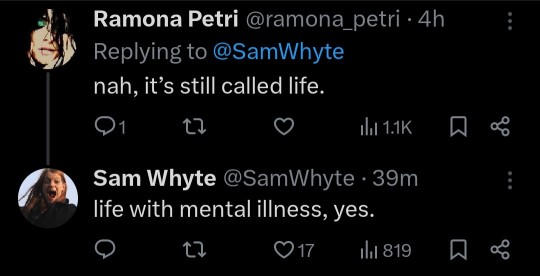
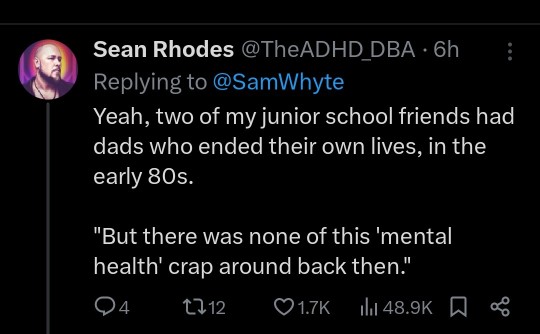



8K notes
·
View notes
Text

Grave of a Suicide Victim (1900)
— by Wilhelm Kotarbiński
#painting#art#art history#classical art#dark art#dark academia#mental health awareness#classic academia#oil on canvas#oil painting#artist#art blog#goth#gothic#artists#flowers#night#red academia#historical painting#historical art#art community#art gallery#academia
4K notes
·
View notes
Text
I recently had to do a project in one of my psych classes, and man, I knew that CBT was used for every little thing, but seeing over and over, "do CBT! CBT is the best for every mental illness!" was so jarring. I'm absolutely biased because of my own experiences, but I just don't think it's as universal a treatment model as it's touted.
If you didn't benefit from CBT, it's not because you're lazy or didn't try hard enough or lacked intelligence or foresight into your own needs. Frankly, it's a therapy model that (I think) shouldn't be the only readily-accessible model and among the only therapy models covered by insurance. Some of us should not be treated in a CBT model and that's okay. It's not a sign of poor character or unreasonable demands, and if you don't think it's a model that works for you, then it's your right to express that!
#mental health#mental health advocacy#it was just so annoying because every resource i could access for this project often ONLY recommended cbt and#that just doesn't seem helpful for a good chunk of people#because i know i never benefitted from that model of therapy#obligatory: i am not against this therapy. me having a negative experience with it is not indicative that i believe it should be abolished'#if it works for you: KEEP DOING IT. cbt is not inherently harmful for MANY people and it's a good and valuable tool for many#but the overemphasis of cbt as the Only Therapy Model You Need sends this message that YOU failed...#...if you don't miraculously recover with that therapy model. it often feels like you'll Fail Recovery/Therapy and you're now a Bad Person#i've tried for over a decade to stick out cbt with a dozen therapists to boot. so i think i know a thing or two about my experiences with it#and overall its an unimpressive model (for me) as someone whos had a history with abuse and miscellaneous mental knickknacks rattling around#it's also frustrating because i genuinely like psych and i love learning about people#it's just. i'm tired of only being exposed to cbt (because i hate it honestly)#i feel similarly about cbt as i do with sigmund fucking frued#anyway i just want other insane people (affectionate) to remember that they deserve to not beat themselves up over this#if you're an insane person reading this: i love you i love you i love you i love you#i will share a slice of cake and homemade bread with you <3
1K notes
·
View notes
Text

Good strategy
242 notes
·
View notes
Text
"I believe in poems as I do in haunted houses.We say someone must have died here."
Rosa Alacia,"Voice:An essay, from My other tongue."
@luciferslilith7
#aesthetic#dark academia#chaotic academia#spilled ink#classic academia#academia#spilled thoughts#light academia#classic literature#the secret history#donna tartt#rosa alacia#qoutes#dark academia books#dark academia quotes#the song of achilles#the goldfinch#the picture of dorian gray#if we were villains#dead poets society#poets corner#writers of tumblr#writeblr#booklr#feelingsoftheday#mental health#gothic academia#gothic literature#gothic quotes#fyodor dostoevsky
261 notes
·
View notes
Text


from two months ago, when i was busy with my last ever finals (i meant to post this back then)!! my 3L hobonichi ended in march so i had to use the last few grid pages as a weekly schedule bc i wanted to keep the school year contained in one planner, which actually worked out great since i wasn't doing much everyday aside from studying....
#not me going to therapy back-to-back on the weekend bc my mental health was in shambles#i will NOT be missing law school lmaooo#if anything i miss college the most bc i took fun classes like art history and medieval history :((#tea-tuesday#studyblr#mine#studyspo#study inspiration#study#studying#study motivation#makeshift hobonichi#hobonichi#chaotic academia#chaotic academic aesthetic
282 notes
·
View notes
Text
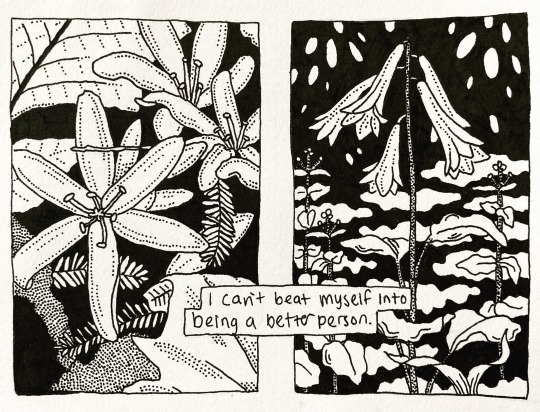
A page spread from the zine I’m working on- Brain School 2: Some Things I Learned 🖤
#illustration#my work#drawing#art#sketchbook#stippling#natural history#botanical illustration#botanical drawing#mental health#mental health art#mental health zine#zine in progress#wildflowers
2K notes
·
View notes
Text
Wow.
"This tendency to misdiagnose victims was at the heart of a controversy that arose in the mid-1980s when the diagnostic manual of the American Psychiatric Association came up for revision. A group of male psychiatrists proposed that "masochistic personality disorder" be added to the canon. This hypothetical diagnosis applied to any person who "remains in relationships in which others exploit, abuse, or take advantage of him or her, despite opportunities to alter the situation." A number of women's groups were outraged and a heated public debate ensued. Women insisted on opening up the process of writing diagnostic canon, which had been the preserve of a small group of men, and for the first time took place in the naming of psychological reality.
I was one of the participants in this process. What struck me most at the time was how little rational argument seemed to matter. The women's representatives came to the discussion prepared with carefully reasoned, extensively documented position papers, which argued that the proposed diagnosis concept had little scientific foundation, ignored recent advances in understanding the psychology of victimization, and was socially regressive and discriminatory in impact, since it would be used to stigmatized disempowered people. The men of the psychiatric establishment persisted in bland denial. They admitted freely that they were ignorant of the extensive literature of the past decade on psychological trauma, but they did not see why it should concern them. One member of the Board of Trustees of the American Psychiatric Association felt the discussion of battered women was "irrelevant". Another stated simply, "I never see victims".
In the end, because of the outcry from organized women's groups and the widespread publicity engendered by the controversy, some sort of compromise became expedient. The name of the proposed entity was changed to "self-defeating personality disorder." The criteria for the diagnosis were changed, so that the label could not be applied to people who were known to be physically, sexually, or psychologically abused. Most important, the disorder was included not in the main body of the text but in an appendix. It was regulated to apocryphal status within the canon, where it languishes to this day."
Judith L. Herman, M.D., Trauma and Recovery.
#women's history#psychiatry#feminism#psychology#mental health#history#history of psychology#women's rights#trauma#violence against women
218 notes
·
View notes
Text

Anneliese Michel was born on September 21, 1952, in Leiblfing, Bavaria, West Germany. Raised in a devoutly Catholic family, Anneliese was described as a kind and studious girl. Her life took a drastic turn when, at the age of 16, she experienced her first seizure. She was subsequently diagnosed with temporal lobe epilepsy and began treatment with anticonvulsant drugs. However, her condition did not improve, and she soon developed severe depression.
As her health continued to decline, Anneliese began to report seeing demonic faces and hearing voices telling her she was damned. She became increasingly convinced that she was possessed by demonic forces. Despite medical treatment, her condition worsened, and she exhibited disturbing behaviors, including self-harm, aggression, and the refusal to eat.
Frustrated with the lack of progress through conventional medical treatment, Anneliese's deeply religious family sought help from the Catholic Church. They eventually found two priests, Ernst Alt and Arnold Renz, who believed that Anneliese was indeed possessed. In September 1975, Bishop Josef Stangl granted permission for an exorcism to be performed under the Roman Ritual of 1614.
Over the next ten months, Anneliese underwent 67 exorcism sessions. During these sessions, she displayed extreme behaviors, including speaking in different voices, contorting her body, and exhibiting extraordinary strength. Despite these intense and grueling sessions, her condition continued to deteriorate.
On July 1, 1976, Anneliese Michel died in her home. An autopsy revealed that she had succumbed to severe dehydration and malnutrition, weighing just 68 pounds at the time of her death. Her knees were broken due to continuous genuflections, a common part of the exorcism ritual.
The death of Anneliese Michel led to criminal charges against her parents and the two priests who conducted the exorcisms. They were accused of negligent homicide for failing to call a doctor to address her deteriorating physical condition. The trial, which began in 1978, drew international attention and sparked widespread debate.
During the trial, recordings of the exorcism sessions were played, providing disturbing evidence of Anneliese's suffering. The defense argued that Anneliese had the right to refuse medical treatment and that she had chosen to undergo exorcism. However, the prosecution contended that the priests and her parents should have sought medical intervention.
In the end, all four defendants were found guilty of manslaughter resulting from negligence and were sentenced to six months in prison (later suspended) and three years of probation.
164 notes
·
View notes
Text
Bernard thinking of Tim as his good luck charm who always saves him from the terrible things in his life vs Tim thinking he attracts danger to his loved ones just by being around them…this is so fascinating and also so unhealthy for both of them. I’m studying them like bugs.
#adding to my thoughts re: Tim having a history of blaming himself for deaths he didn’t cause (like Janet’s)#Bernard meanwhile seems to only have ONE person as his primary support system and it’s Tim. at least Tim has friends & family#<- yet another reason to bring back Laura Fell 👍 and also introduce Bernard to YJ imo#tim drake#bernard dowd#in fact I’d settle for seeing Bernard interact with even one of Tim’s siblings. just remembered he has never interacted with them on panel.#batfam#timbern#tim drake: robin#heroesriseandfall#timber#bat mental health
2K notes
·
View notes
Text
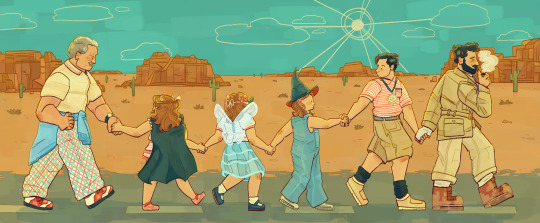
bidididibumbum to san fernandooo
#asteroid city#wes anderson#the goods#jason schwartzman#augie steenbeck#jake ryan#woodrow steenbeck#tom hanks#stanley zak#not gonna tag the triplets. bc theyre kids and that feels weird#anyway i loved this movie i havent stopped thinking about it in days. idgaf about it having mostly 1 stars on google#this is a movie for the girlies on a space age history kick in denial about the state of their mental health < me
964 notes
·
View notes
Text



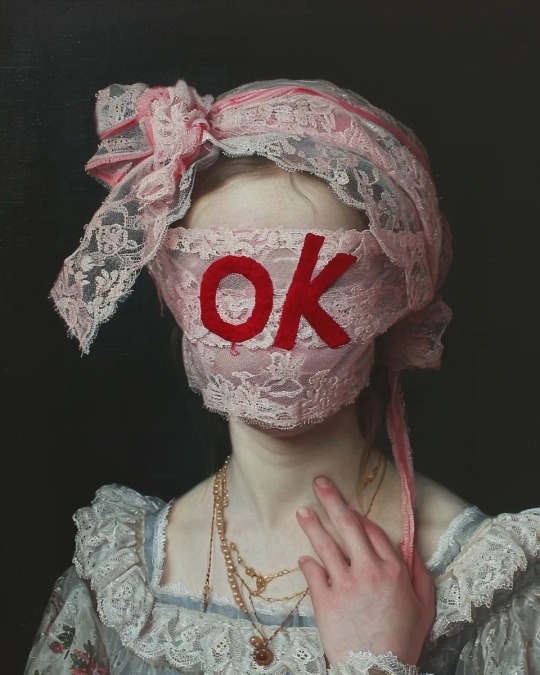
daily reminder ♡
— by silasehrazatyucel
#art#painting#artblr#positivity#quotes#quote#prose#artist#oil on canvas#classical art#oil painting#illustration#illustrating#illustrations#classic academia#mental health awareness#mental health#light academia#art history#digital art#aesthetic#feminine#art community#artists
357 notes
·
View notes
Text


Can't believe I'm finally defending my thesis next week!
#catch me trying to not dox myself#thesis#thesis era#academia#studying#university#philosophy#history#1700s#18th century#history of medicine#mental health#british philosophy#émilie du châtelet#french philosophy#age of enlightenment#hysteria#studyblr
106 notes
·
View notes
Text
Today is Holocaust Remembrance Day. This whole week l have been thinking alot about the Holocaust. So last night I re-read maus. One panel really stuck out to me during this reading. For context this is in Maus 2 when Art is talking to his therapist, a Holocaust survivor, about how he feels he could never measure up to his father who survived Auschwitz. At this point in the story his father had already past. May his memory be a blessing.

The dialogue, “but you weren’t in Auschwitz. You were in Rego Park,” hit me like a punch to the chest. I have no better way to explain the paradoxical guilt I felt and continue to feel as the granddaughter of a Holocaust survivor. I did not live during the Holocaust. It had ended before my grandmother reached eighteen years old. And yet, the Shoah seems to loom over me. Forever a reminder, that I am alive by sheer luck. My great grandfather’s parents as well as two of his brothers were murdered in Auschwitz. My great grandmother’s twin sister was also murdered in the Holocaust. Despite hours of research, I still have no idea where exactly she died.
Using the term guilty for what I feel doesn’t seem exactly right but there is no better word in the English language. Maybe if I was smarter or more articulate I could find better words.
A key theme of this chapter is intergenerational trauma. This is the same chapter that has this iconic image.

On this Holocaust Remembrance Day, I simply want to acknowledge the real and extremely painful intergenerational trauma and inherited survivors guilt felt by descendants of Jewish survivors. I know I struggled in the past with feeling like I even have any right to feel this way considering I am three generations removed from any of my family that were murdered in the Holocaust. If any other Jews struggle with thoughts like this, I want to assure you that your feelings are valid and real. Intergenerational trauma is complicated and the feelings that come with it don’t simply disappear once a certain number of generations from the event pass.
This post is specifically about the Holocaust and jewish intergenerational trauma stemming from our persecution and genocide. If this post resonates with you as a non-Jew who has intergenerational trauma I am glad, but please do not derail this post.
#history#holocaust remembrance day#holocaust#shoah#intergenerational trauma#jumblr#jewish history#shoah mention#tw shoah#holocaust mention#tw holocaust#judaism#maus#antisemitism#jewish trauma#survivors guilt#mental health
169 notes
·
View notes